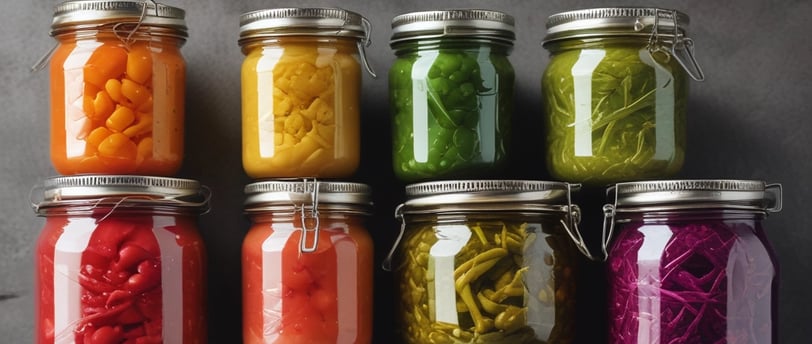Elevate Your Wellness with Culinary Nutrition and Expert Consulting Services
Discover how Chef RD Consulting LLC combines nutrition and culinary expertise to enhance individual and corporate wellness. Let's talk Food Preservation and Ingredient Application:
5/8/20243 min read


20 Fermented Vegetables: Nutrition, Health, and Culinary Use:
1. Cabbage (Sauerkraut)
Key Nutrients: Vitamin C, K2, fiber, lactic acid bacteria
Health Benefits: Gut health, immune support, cardiovascular protection
Applications: Reuben sandwich, slaw topping for sausages, grain bowl garnish
2. Napa Cabbage (Kimchi)
Key Nutrients: Vitamins A, B2, C, probiotics, capsaicin
Health Benefits: Anti-inflammatory, digestive support, potential lipid-lowering effect
Applications: Kimchi fried rice, savory pancake (jeon), kimchi stew
Remember Kimchi is a Verb-there are several types of Kimchi, the most common is Napa Cabbage based and traditionally contains Shrimp (so allergy awareness!) but can be made and sold as Vegan by omitting that. You can Kimchi cucumbers, radish, cabbage, etc
3. Carrots
Key Nutrients: Beta-carotene, fiber, vitamin K1
Health Benefits: Antioxidant-rich, supports vision and skin
Applications: Pickle platter, fermented carrot hummus, wrap filling
4. Daikon Radish
Key Nutrients: Vitamin C, enzymes (amylase), potassium
Health Benefits: Aids digestion, detoxifying, supports metabolism
Applications: Banchan side, miso soup topping, fermented daikon salsa
5. Beets
Key Nutrients: Folate, nitrates, iron
Health Benefits: Cardiovascular support, blood pressure regulation
Applications: Beet kvass, roasted veggie bowls, probiotic beet dip
6. Cucumbers (Pickles)
Key Nutrients: Vitamin K, water, probiotics (when lacto-fermented)
Health Benefits: Hydration, bone support, gut microbiota balance
Applications: Sandwich topping, tzatziki, burger filler
7. Green Beans
Key Nutrients: Vitamin K, manganese, fiber
Health Benefits: Supports digestion, may aid in blood sugar regulation
Applications: Salad booster, antipasto, pickled green bean stir-fry
8. Garlic
Key Nutrients: Allicin, manganese, vitamin B6
Health Benefits: Antimicrobial, cardiovascular benefits
Applications: Garlic paste for marinades, ramen topping, probiotic garlic butter
9. Onions
Key Nutrients: Quercetin, sulfur compounds
Health Benefits: Anti-inflammatory, blood sugar support
Applications: Burger topping, sour cream dip, fermented onion soup base
10. Turnips
Key Nutrients: Vitamin C, calcium, glucosinolates
Health Benefits: Immune support, liver detoxification
Applications: Turnip kimchi (Kkakdugi), root vegetable salad, probiotic mash
11. Cauliflower
Key Nutrients: Fiber, vitamin C, choline
Health Benefits: Anti-cancer potential, supports brain health
Applications: Pickled veggie platter, curried cauliflower rice, tacos
12. Broccoli Stems
Key Nutrients: Sulforaphane, vitamin K, fiber
Health Benefits: Cancer-fighting potential, digestive health
Applications: Noodle stir-fry, fermented slaw, pizza topping
13. Tomatoes (Green)
Key Nutrients: Vitamin C, lycopene (less in green), fiber
Health Benefits: Antioxidant-rich, may support heart health
Applications: Salsa verde, pickled garnish, probiotic bruschetta
14. Peppers (Sweet or Hot)
Key Nutrients: Vitamin C, capsaicin, carotenoids
Health Benefits: Immune boosting, metabolic enhancement
Applications: Fermented hot sauce, relish, topping for tacos
15. Scallions
Key Nutrients: Vitamin K, sulfur, fiber
Health Benefits: Supports digestion, prebiotic effects
Applications: Kimchi variation, rice noodle salad, soup garnish
16. Zucchini
Key Nutrients: Manganese, vitamin C, potassium
Health Benefits: Digestive aid, blood sugar regulation
Applications: Fermented squash relish, salad topper, veggie wrap filler
17. Corn (young, raw)
Key Nutrients: B vitamins, fiber, antioxidants
Health Benefits: Supports metabolism, gut health
Applications: Corn salsa, taco filler, corn salad
18. Asparagus
Key Nutrients: Folate, vitamin K, glutathione
Health Benefits: Liver support, anti-aging antioxidant
Applications: Charcuterie pickle, pasta topper, sandwich addition
19. Celery
Key Nutrients: Vitamin K, fiber, electrolytes
Health Benefits: Anti-inflammatory, hydration
Applications: Fermented celery slaw, soup base, juice booster
20. Pumpkin or Winter Squash
Key Nutrients: Beta-carotene, vitamin E, fiber
Health Benefits: Eye health, immune support, antioxidant-rich
Applications: Spiced squash chutney, fermented mash, wrap filler
___________________________________________________________________________________________________
References for further learning:
General Fermentation and Health Benefits
Marco, M. L., et al. (2017). Health benefits of fermented foods: microbiota and beyond.
Current Opinion in Biotechnology, 44, 94–102. https://doi.org/10.1016/j.copbio.2016.11.010Tamang, J. P., Watanabe, K., & Holzapfel, W. H. (2016). Diversity of microorganisms in global fermented foods and beverages.
Frontiers in Microbiology, 7, 377. https://doi.org/10.3389/fmicb.2016.00377Rezac, S., et al. (2018). Fermented foods as a dietary source of live organisms.
Frontiers in Microbiology, 9, 1785. https://doi.org/10.3389/fmicb.2018.01785
Specific Vegetables and Their Benefits
Park, K. Y., et al. (2014). Health benefits of kimchi (Korean fermented vegetables) as a probiotic food.
Journal of Medicinal Food, 17(1), 6–20. https://doi.org/10.1089/jmf.2013.3083Roberfroid, M. (2007). Prebiotics: The concept revisited.
The Journal of Nutrition, 137(3 Suppl 2), 830S–837S. https://doi.org/10.1093/jn/137.3.830SHur, S. J., et al. (2014). Effect of fermentation on the antioxidant activity in plant-based foods.
Food Chemistry, 160, 346–356. https://doi.org/10.1016/j.foodchem.2014.03.112Filannino, P., et al. (2018). Metabolic and functional paths of lactic acid bacteria in vegetable fermentations.
Frontiers in Microbiology, 9, 2658. https://doi.org/10.3389/fmicb.2018.02658Wastyk, H. C., et al. (2021). Gut-microbiota-targeted diets modulate human immune status.
Cell, 184(16), 4137–4153.e14. https://doi.org/10.1016/j.cell.2021.06.019Dimidi, E., et al. (2019). Fermented foods: definitions and characteristics, impact on the gut microbiota and effects on gastrointestinal health and disease.
Nutrients, 11(8), 1806. https://doi.org/10.3390/nu11081806Swain, M. R., Anandharaj, M., Ray, R. C., & Rani, R. P. (2014). Fermented fruits and vegetables of Asia: a potential source of probiotics.
Biotechnology Research International, 2014, 250424. https://doi.org/10.1155/2014/250424
